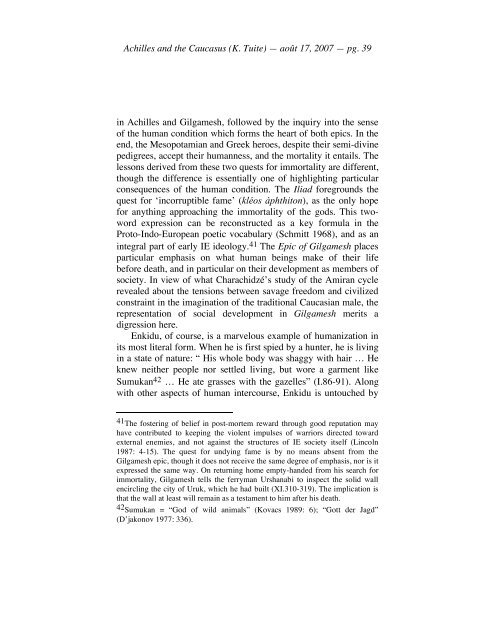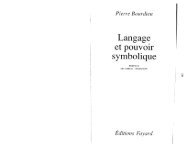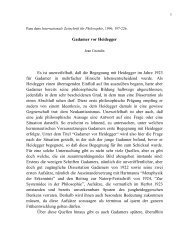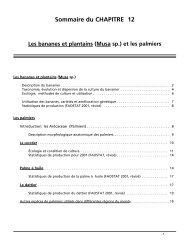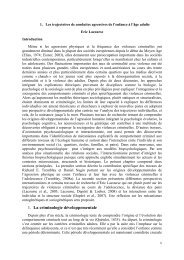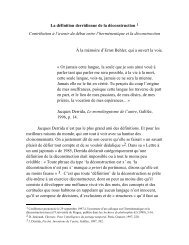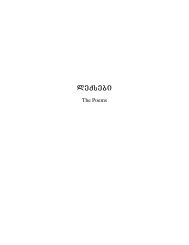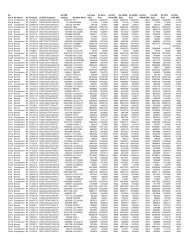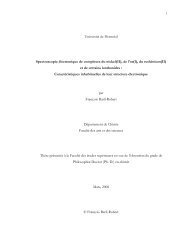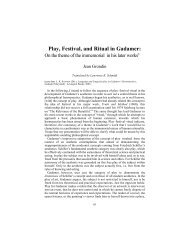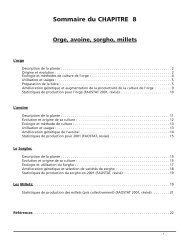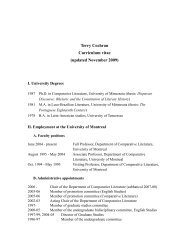Achilles and the Caucasus - Université de Montréal
Achilles and the Caucasus - Université de Montréal
Achilles and the Caucasus - Université de Montréal
Create successful ePaper yourself
Turn your PDF publications into a flip-book with our unique Google optimized e-Paper software.
<strong>Achilles</strong> <strong>and</strong> <strong>the</strong> <strong>Caucasus</strong> (K. Tuite) — août 17, 2007 — pg. 39<br />
in <strong>Achilles</strong> <strong>and</strong> Gilgamesh, followed by <strong>the</strong> inquiry into <strong>the</strong> sense<br />
of <strong>the</strong> human condition which forms <strong>the</strong> heart of both epics. In <strong>the</strong><br />
end, <strong>the</strong> Mesopotamian <strong>and</strong> Greek heroes, <strong>de</strong>spite <strong>the</strong>ir semi-divine<br />
pedigrees, accept <strong>the</strong>ir humanness, <strong>and</strong> <strong>the</strong> mortality it entails. The<br />
lessons <strong>de</strong>rived from <strong>the</strong>se two quests for immortality are different,<br />
though <strong>the</strong> difference is essentially one of highlighting particular<br />
consequences of <strong>the</strong> human condition. The Iliad foregrounds <strong>the</strong><br />
quest for ‘incorruptible fame’ (kléos áphthiton), as <strong>the</strong> only hope<br />
for anything approaching <strong>the</strong> immortality of <strong>the</strong> gods. This twoword<br />
expression can be reconstructed as a key formula in <strong>the</strong><br />
Proto-Indo-European poetic vocabulary (Schmitt 1968), <strong>and</strong> as an<br />
integral part of early IE i<strong>de</strong>ology. 41 The Epic of Gilgamesh places<br />
particular emphasis on what human beings make of <strong>the</strong>ir life<br />
before <strong>de</strong>ath, <strong>and</strong> in particular on <strong>the</strong>ir <strong>de</strong>velopment as members of<br />
society. In view of what Charachidzé’s study of <strong>the</strong> Amiran cycle<br />
revealed about <strong>the</strong> tensions between savage freedom <strong>and</strong> civilized<br />
constraint in <strong>the</strong> imagination of <strong>the</strong> traditional Caucasian male, <strong>the</strong><br />
representation of social <strong>de</strong>velopment in Gilgamesh merits a<br />
digression here.<br />
Enkidu, of course, is a marvelous example of humanization in<br />
its most literal form. When he is first spied by a hunter, he is living<br />
in a state of nature: “ His whole body was shaggy with hair … He<br />
knew nei<strong>the</strong>r people nor settled living, but wore a garment like<br />
Sumukan 42 … He ate grasses with <strong>the</strong> gazelles” (I.86-91). Along<br />
with o<strong>the</strong>r aspects of human intercourse, Enkidu is untouched by<br />
41 The fostering of belief in post-mortem reward through good reputation may<br />
have contributed to keeping <strong>the</strong> violent impulses of warriors directed toward<br />
external enemies, <strong>and</strong> not against <strong>the</strong> structures of IE society itself (Lincoln<br />
1987: 4-15). The quest for undying fame is by no means absent from <strong>the</strong><br />
Gilgamesh epic, though it does not receive <strong>the</strong> same <strong>de</strong>gree of emphasis, nor is it<br />
expressed <strong>the</strong> same way. On returning home empty-h<strong>and</strong>ed from his search for<br />
immortality, Gilgamesh tells <strong>the</strong> ferryman Urshanabi to inspect <strong>the</strong> solid wall<br />
encircling <strong>the</strong> city of Uruk, which he had built (XI.310-319). The implication is<br />
that <strong>the</strong> wall at least will remain as a testament to him after his <strong>de</strong>ath.<br />
42 Sumukan = “God of wild animals” (Kovacs 1989: 6); “Gott <strong>de</strong>r Jagd”<br />
(D’jakonov 1977: 336).


